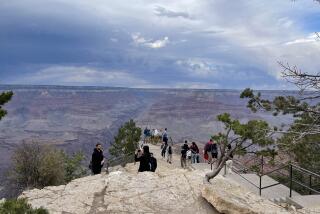Test Costs Force 3 Campgrounds to Shut Off Water
- Share via
A change in federal water quality regulations is forcing the U. S. Forest Service to turn off water taps at three campgrounds in Angeles National Forest this weekend, even though there are no indications that water there is unsafe, a Forest Service official said Friday.
The shut-offs will leave the Los Alamos campground as the only one with drinking water in the forest’s Saugus district, located north of Santa Clarita, said Jim McGauley, assistant recreation officer.
McGauley stressed that the water is not being shut off because of complaints about water purity. Rather, it is because the Forest Service does not have enough money to comply with water safety regulations issued by the federal Environmental Protection Agency this summer. Under the new regulations, campground water sources must be treated and checked daily for contamination. Previously, Forest Service workers tested the purity of campground water once a month.
McGauley said the agency cannot afford to test the water daily or install chlorination equipment in the Saugus district immediately. Only Los Alamos is equipped to chlorinate drinking water.
Although their taps will be dry after this weekend, the Cottonwood, Bouquet and Oak Flat campgrounds will remain open to the public, he said.
2 Closed in Summer
Two campsites normally closed during the winter, Spunky and Falls, were closed this summer because of the water regulations. Officials said the sites are remote and hard to supervise. The Streamside campsite will be closed after deer season ends in November.
Many of the campgrounds are near a stream that parallels Bouquet Canyon Road, but McGauley said the stream water is not safe to drink. He warned campers that many other streams in the area are polluted.
Forest Service officials have estimated that it will cost between $100,000 and $500,000 to install chlorination equipment in the campgrounds by next summer, when the most campers visit the forest. McGauley said the agency is unsure whether sufficient funds will be available to pay for the equipment.
“We’ll have to regroup and see if we can get the money,” he said. “You’re talking about some big money.”
More to Read
Sign up for Essential California
The most important California stories and recommendations in your inbox every morning.
You may occasionally receive promotional content from the Los Angeles Times.










